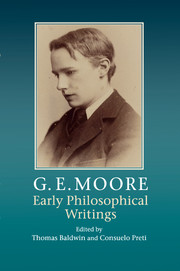
- Cited by 3
-
Cited byCrossref Citations
This Book has been cited by the following publications. This list is generated based on data provided by Crossref.
2011. Books Received. Philosophy, Vol. 86, Issue. 3, p. 473.
Preti, Consuelo 2013. Judgement and Truth in Early Analytic Philosophy and Phenomenology. p. 183.
Sinclair, Neil 2018. The Naturalistic Fallacy.
- Publisher:
- Cambridge University Press
- Online publication date:
- June 2012
- Print publication year:
- 2011
- Online ISBN:
- 9780511921285
- Subjects:
- Twentieth-Century Philosophy, Philosophy


